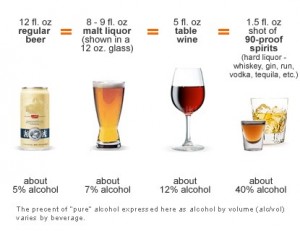Does a higher price tag, longer aging, or specific Sommelier-approved pairings impact the way in which the body reacts to alcohol intake? The base for all consumed alcohol is ethanol which is broken down in the liver the exact same way. Here are equivalent breakdowns:
Only about 20% of the consumed alcohol is absorbed in the stomach and about 80 percent is absorbed in the small intestine. The rate of alcohol consumption is dependent on a few variables:
- The Concentration: The higher the concentration of alcohol, the faster it is absorbed.
- The Type of Alcohol: Carbonation tends to speed up the absorption of alcohol.
- Whether the Stomach is Full or Empty: Food slows down alcohol absorption.
- Gender and BMI: Gender and body mass index plays a role in the attenuation of alcohol.
Effects of Alcohol Consumption:
The rate of how alcohol is consumed and evacuated will impact the effects. Using a breathalyzer can give you an understanding of how your body reacts. Here are the different stages as the body responds to alcohol and how it impacts your blood alcohol concentration (BAC).
Euphoria (BAC= 0.03 to 0.12 percent) – The effects vary of course from person to person, but most commonly one becomes more self-confident. A shorter attention span and a flushed appearance is also apparent.
Excitement (BAC = 0.09 to 0.25 percent) – Judgement becomes impaired. Fine movements such as signing your name, or writing may become difficult.
Confusion (BAC = 0.18 to 0.30 percent) – Sleepiness, problems understanding or remembering (even recent events), delayed reaction to stimuli – verbal or physical. The room may spin slightly.
Stupor (BAC = 0.25 to 0.4 percent) – May not feel pain as readily, slurred speech, and uncoordinated movement. Blurred vision, and heavily impaired.
Coma (BAC = 0.35 to 0.50 percent) – Unable to respond to stimuli. Unable to stand or walk. Lapse in and out of consciousness.
Decrease Risk of Negative Effects:
Start your evening with some coffee. Alcohol drinkers who consume four or more cups of coffee daily have a five time lower incidence of cirrhosis than those who do not drink coffee. (pubmed.com)
Smokers who drink regularly and consume one pack of cigarettes per day experience three times the risk of cirrhosis compared to those who do not smoke. (pubmed.com)
Proper nutrition coupled with abstaining from alcohol will aid in recovery. The liver is the only organ in the body that can regenerate, in certain cases 50% of the liver can be regenerated after 30 days after an observed overdose from Tylenol. (uihealthcare.org)
Proper hydration is important. As your kidneys remove alcohol from the body, a lot of water is lost also. Maintaining proper hydration as your body recovers is important. After a night out if you feel like you’ve lost enough fluid and feel severely dehydrated, consult with a physician.
Alcohol Positives:
In moderation red wine can release high density lipoprotein, HDL (the good cholesterol), and has anti-oxidant properties as well. Reservatrol and polyphenols are both found in grapes and red wine. Reservatrol also lowers low density lipoprotein, LDL (the bad cholesterol), reduces the formation of blood clots, and may reduce blood pressure. (Mayoclinic)
There is also a histamine intolerance that comes with drinking red wine. For some it may produce headaches, sneezing, and may exacerbate an allergic reaction for those with certain allergies. (Pubmed)
http://www.ncbi.nlm.nih.gov/pubmed/8005453
http://www.ingentaconnect.com/content/ocean/aap/1994/00000015/00000001/art00006?token=005f1e4f9b8d5b7b984b297e2a46762c6b665d3b7046706a3a762f2d673f7b2f27375f2a72752d700a8014004911409
http://www.mayoclinic.org/diseases-conditions/heart-disease/in-depth/red-wine/art-20048281?pg=2
http://www.healthline.com/health-news/coffee-reduces-risk-of-death-from-cirrhosis-040314
http://www.uihealthcare.org/liver-disease-frequently-asked-questions/
http://www.mayoclinic.org/diseases-conditions/heart-disease/in-depth/red-wine/art-20048281
http://www.ncbi.nlm.nih.gov/pubmed/19298457
http://onlinelibrary.wiley.com/doi/10.1111/j.1365-2796.2009.02082.x/full
The information provided is for general interest only and should not be misconstrued as a diagnosis, prognosis or treatment recommendation. This information does not in any way constitute the practice of medicine, or any other health care profession. Readers are directed to consult their health care provider regarding their specific health situation. Marque Medical is not liable for any action taken by a reader based upon this information.


